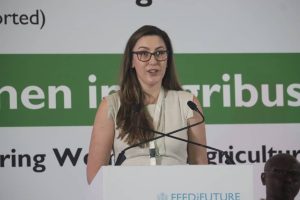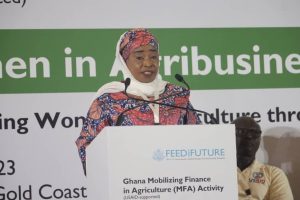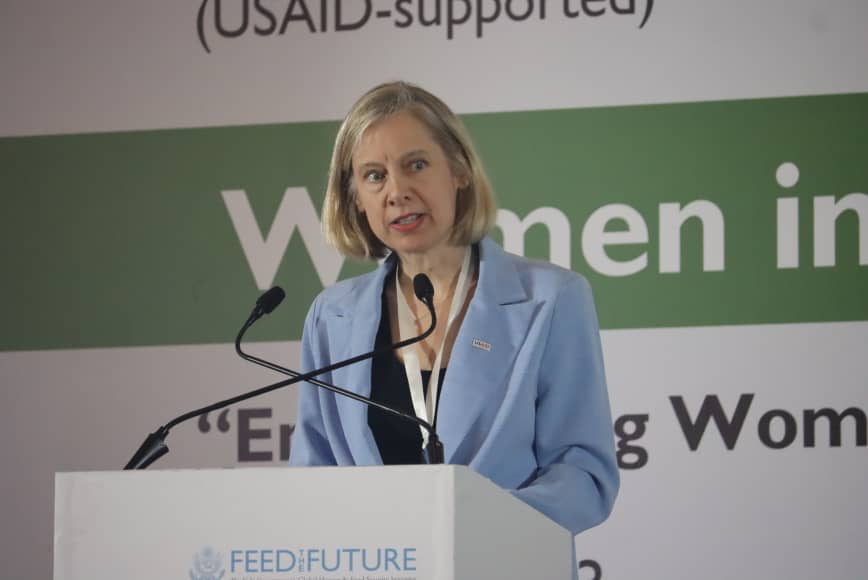
The U.S. Government today hosted its first-ever “Women in Agribusiness” Summit.
The event showcased investment opportunities in Ghanaian agribusinesses led by women and connected women entrepreneurs to investors for financing.
The event, hosted by the USAID-supported Feed the Future Ghana Mobilizing Finance in Agriculture (MFA) Activity, focused on empowering women in agriculture through enhanced access to finance.
It brought together agribusinesses, transaction advisors, investors, financial institutions, U.S. and Ghana government representatives, non-governmental organizations, trade associations, research institutions, civil society groups and the media.
In her remarks, Kimberly Rosen, Mission director for USAID Ghana, said, “We know that empowering women in agribusiness is the key to unlocking their full potential. That’s why the U.S. Government has supported Ghanaian agribusinesses through USAID and Feed the Future with over $204.47 million in financing for more than 33,000 agribusinesses, over half of which are women-led and women-owned. This increases agricultural productivity and improves food security in Ghana.”

She added that USAID believes in promoting gender equality and recognizes the unique role that women play in this important industry. “Women are the backbone of agriculture, and their contributions to food security and national development are invaluable. But, we all know that there are still many challenges that women face, like lack of access to land, financing, markets, agricultural technologies, and inputs,” she emphasized.
Agriculture is a major contributor to the development and growth of Ghana’s economy, contributing to gross domestic product, employment, food security and nutrition. Although women play a vital role in Ghana’s agricultural sector by providing critical value chain services in production, agro-processing and marketing, their access to business advisory services and commercial finance is limited. The Summit connected women-led agribusinesses in the maize, soy, groundnut, cowpea, mango, cashew, shea, and other high-value export crop sectors to transaction advisors and financial institutions for support to access financing suited to their needs.
Women make up almost 50% of our country’s population, says Honorable Lariba Zuweira Abudu, Minister of Gender, Children and Social Protection,” “We cannot make progress when half of the country is at a constant economic and social disadvantage. As a government, we are poised to ensure that no one is left behind in our
struggle for gender equity, economic transformation, and national development.”

The Summit featured plenary and panel discussions on finance and business advisory support for women-led agribusinesses, and business-to-business meetings that connected 85 women-led agribusinesses with investment opportunities in the maize, soy, groundnut, cowpea, cashew, mango and shea value chains to transaction advisors, financial institutions, and investors for financing. The event culminated in an awards ceremony to recognize exceptional women-led agribusinesses, and organizations that have supported these businesses to realize their potential.
About USAID
The U.S. Agency for International Development—USAID—is the lead U.S. government agency that works to end extreme global poverty and enable resilient, democratic societies to realize their potential. USAID’s activities and strategic partnerships support Ghana’s journey to self-reliance and advance an integrated
approach to development. USAID promotes accountability, sustainable systems, and inclusive development.
About Feed the Future
Feed the Future is the U.S. Government’s initiative to end global hunger. Led by USAID and driven by collaborative partnerships across public and private sectors, including 11 U.S. Government agencies, Feed the Future addresses the root causes of poverty and hunger. This is done by boosting inclusive agriculture-led economic growth, resilience, and nutrition in countries with great need and opportunity for improvement.

